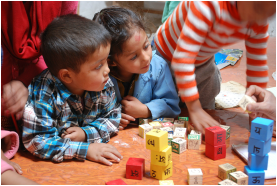|
When we think of the word sustainable, we typically think of the environment or agriculture. At Partners in Sustainable Learning, we use the word in a similar way, indicating that our curriculum is “able to be used without being completely used up” (Webster online dictionary). Many international volunteers and organizations have good intentions when they travel to developing countries to help teachers and schools. They often bring crayons, markers, coloring pages and arts/crafts materials (I also did this in several countries as a summer volunteer). However, these materials do not last. They are “used up” which is the opposite of “sustainable.” This leaves the teacher in the same place she was before the volunteers visited. When traveling to these countries, we need to ask ourselves questions such as; Did the teachers learn new teaching strategies that can be implemented with no or very limited materials? Are the teachers able to engage their students in fun and engaging learning activities without crayons or markers? Our philosophy at Partners in Sustainable Learning is to provide teachers with instructional materials that do not get “used up.” We have developed activities that use natural items. For example, children can count rocks as easily as they can count plastic chips. We try to purchase as many materials as possible in Nepal. This way we are contributing to the local economy. Wooden alphabet blocks (purchased in Nepal) can be used for letter recognition, counting and stacking. Colored paper clips can be used for counting, sorting, sequencing and small motor development. Felt finger puppets (handmade in by Nepali women) can be used for storytelling, creative expression and social-emotional development. Our curriculum includes many other examples of materials that support our sustainability model. We are so excited to bring developmentally appropriate early childhood education to rural Nepal in a sustainable way! Diann Grimm is the Executive Director of Partners in Sustainable Learning. She is also the author of the PiSL Early Childhood Curriculum which was developed specifically for preschools in rural Nepal.
0 Comments
Leave a Reply. |
Archives
September 2016
Categories |
PiSL is a non-profit 501(c)3 organization.
All donations are tax deductible as allowed by law.
PiSL has no governmental, political or religious affiliations.
PiSL is sensitive to the needs of all cultures.
©2023 Partners in Sustainable Learning. All rights reserved.
All donations are tax deductible as allowed by law.
PiSL has no governmental, political or religious affiliations.
PiSL is sensitive to the needs of all cultures.
©2023 Partners in Sustainable Learning. All rights reserved.


 RSS Feed
RSS Feed
